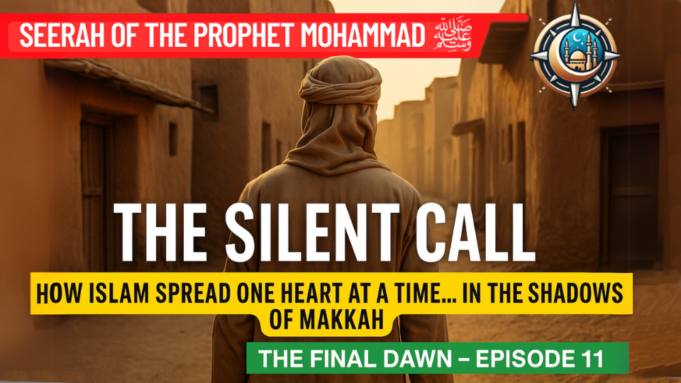It began not with a roar… but with silence.
After the thunderous command to Read, after the trembling descent from the cave of Ḥirāʾ, there came a stillness — unexpected, weighty, divine.
For nearly forty days, revelation paused.
No verses. No voices. Only the echo of that first encounter, resonating within the heart of the one who had been chosen. The man known to his people as al-Amīn — the Trustworthy — now walked through the valleys of Makkah carrying the burden of Prophethood. Alone, yet never forsaken.
He climbed Jabal al-Nour again and again, seeking the voice that had turned his world upside down. But the sky held its breath. The cave stood silent.
And then — it returned.
Suspended between heaven and earth, the angel Jibrīl عليه السلام appeared, stretching across the horizon in majesty. The Prophet ﷺ fled — his heart overwhelmed, his soul trembling — until he reached Khadījah. Daththirūnī… Cover me… he pleaded.
Wrapped in a cloak, wrapped in awe, the second revelation came:
“O you who is wrapped up! Arise and warn… Glorify your Lord… Be patient for the sake of your Lord.”
(Surah al-Muddaththir, 74:1–7)
With Iqraʾ, he had become a Nabī.
With Qum fa-andhir, he became a Rasūl.
Faith at Home:
Revelation had begun. But where does one start when the world is against you? With the heart that already believes.
Khadījah bint Khuwaylid — the first to see the trembling, the first to hear the words, the first to understand. She didn’t need verses. Her conviction was instinctive. Unshaken. Pure. She had said it before the scriptures came: “By Allah, He will never disgrace you.”
Then came Waraqa ibn Nawfal. Elderly. Wise. A reader of ancient texts. He listened… and he affirmed: “This is the same Namūs that came to Mūsā.” A quiet, scholarly confirmation — from the people of scripture — that the man who came down from Ḥirāʾ had indeed been touched by heaven.
The Circle Grows
One by one, they came — not with fanfare, but with hearts tuned to truth.
Zayd ibn Hārithah, once a slave, now family. He needed no proof, no persuasion. The message echoed the character of the man he already loved — just, gentle, unwavering. Zayd embraced Islam with certainty.
ʿAlī ibn Abī Ṭālib — barely ten, raised under the Prophet’s ﷺ care. One evening, he saw Khadījah and Muhammad ﷺ in prayer. No idols. No rituals of old. Just something new… and deeply familiar. The next morning, he chose belief — independent, bold. “Allah created me without asking Abū Ṭālib. Why should I ask his permission to worship Him?”
And then came the closest companion of all…
Abū Bakr as-Ṣiddīq.
When the Prophet ﷺ shared the message, Abū Bakr didn’t ask for a sign. He didn’t demand a miracle. He simply said: “If you say this, I believe you.”
The Prophet ﷺ would later recall:
“Every person I invited to Islam hesitated — except Abū Bakr.”
But Abū Bakr didn’t stop there. Through his quiet strength and dignified presence, others were drawn in: ʿUthmān, Zubayr, Talḥah, ʿAbd al-Raḥmān, Saʿd — names that would one day shape empires. But in that moment, they were just sincere hearts… drawn to a light.
Dār al-Arqam — The Quiet Flame
Islam was still a whisper.
In secret, under the cover of night, believers would gather at a house near Ṣafā. Dār al-Arqam became the sanctuary — not grand, not loud — but alive.
There, they learned what faith meant. Patience under fire. Dignity under insult. Devotion without display.
This wasn’t just a movement. It was a transformation.
A Shepherd’s Encounter
High in the hills, a young shepherd tended his flock.
ʿAbdullāh ibn Masʿūd, a man of low status in society, met the Prophet ﷺ and Abū Bakr on a quiet day. They were thirsty. He was honest.
“These aren’t my goats,” he said. “I can’t give what I don’t own.”
And then, a miracle. Milk from a dry goat. A prayer… answered.
He saw. He believed. And he would become one of the Qur’ān’s greatest voices — shaped by the very lips that received it.
The Cost of Truth
Faith comes freely. But for some, the price was everything.
Bilāl ibn Rabāḥ, an Abyssinian slave, was dragged across burning sands. Stones upon his chest. Whips on his back. His lips, however, never surrendered: “Aḥad… Aḥad…”
Sumayyah, the mother of ʿAmmār, stood unbroken before the cruelty of Abū Jahl. She bled for the truth. She became its first martyr.
Islam was not born in ease.
It was nurtured in pain.
And yet… it grew.
Not with swords.
Not with silver.
But with sincerity — one soul at a time.
In the house of al-Arqam, a revolution was brewing.
And soon, the time would come for the whisper to become a voice.
“And warn your closest kinsmen…”
(Surah Ash-Shuʿarā, 26:214)
The silent beginning… was nearly over.









